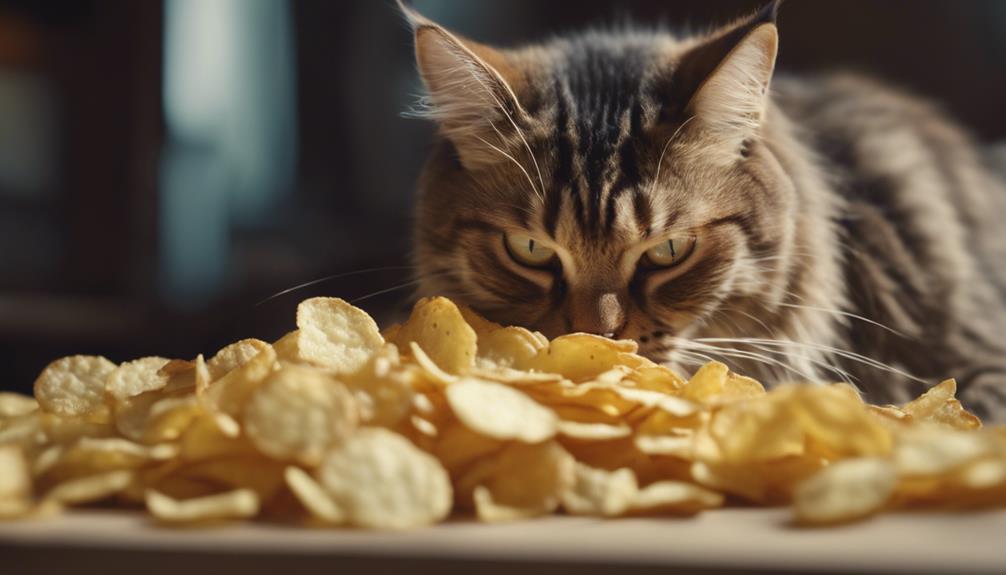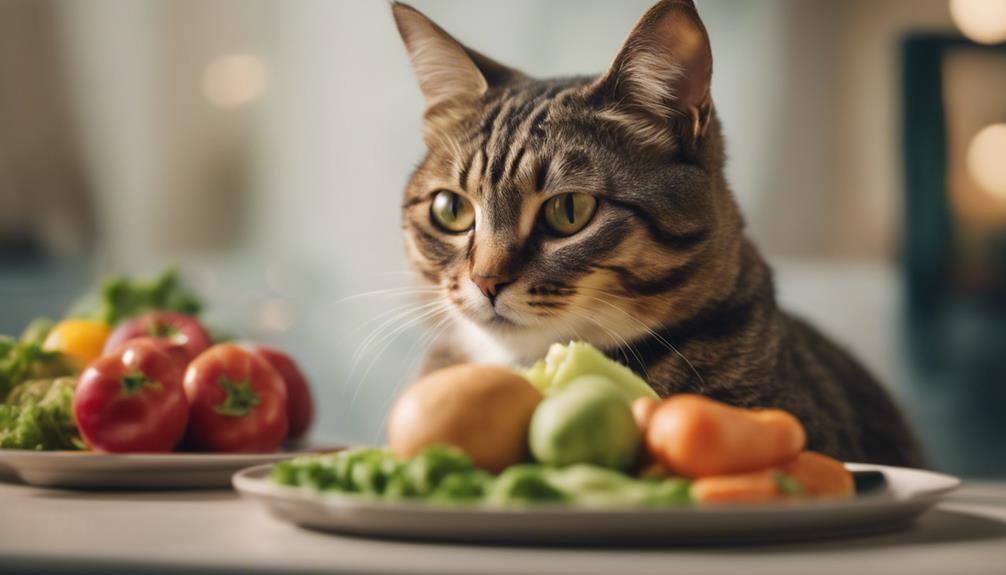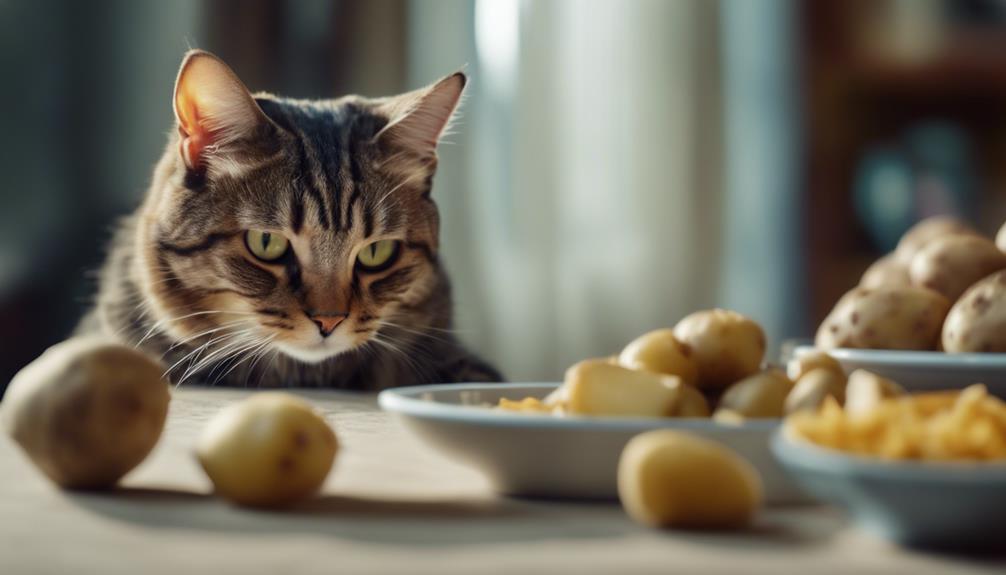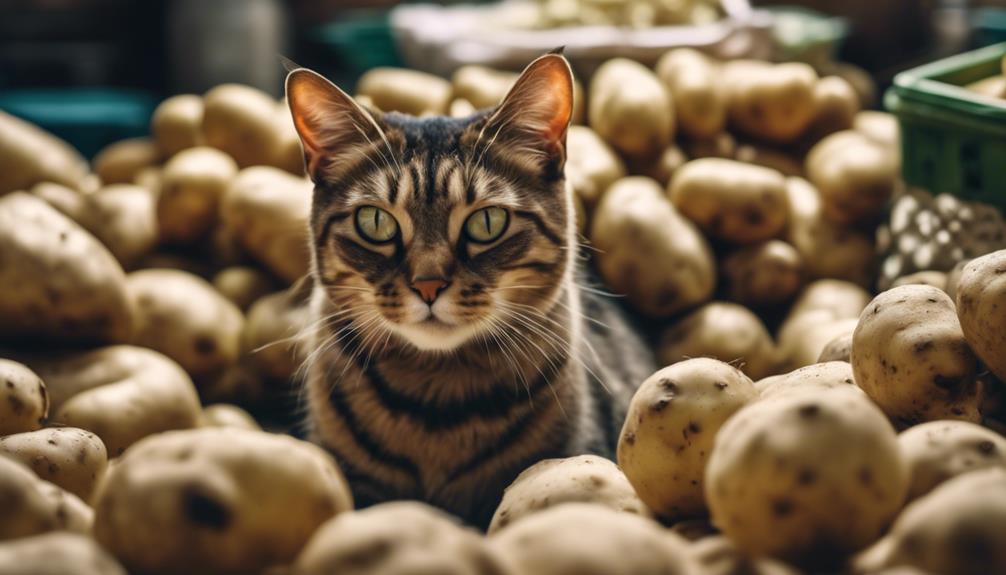As feline enthusiasts, it's crucial to navigate the complexities of our cats' dietary requirements with diligence. The question of whether cats can consume potatoes often sparks debates among pet owners. While some may view this starchy delight as a harmless treat, others raise concerns about the potential risks involved.
Understanding the nuances of offering potatoes to our feline companions is essential for their well-being. So, what factors should be considered before incorporating this vegetable into your cat's diet? Let's explore this topic further to unravel the mysteries surrounding cats and potatoes.
Key Takeaways
- Uncooked potatoes are toxic for cats due to solanine.
- Cooked potatoes are safer but offer minimal nutrition.
- Opt for specially formulated cat treats over potatoes.
- Consult a vet for safe and balanced dietary choices.
Risks of Feeding Uncooked Potatoes
Feeding uncooked potatoes to cats poses a significant risk due to the presence of solanine, a toxic compound that can harm their health. Solanine, found in higher concentrations in green bits or green potatoes, can cause gastrointestinal disturbances, neurological issues, and even affect the heart if ingested by cats.
It is crucial to remember that cats lack the necessary enzymes to break down solanine effectively, making uncooked potatoes unsuitable for their consumption. To ensure the well-being of your feline companion, always opt for cooked potatoes as occasional treats, while being cautious to avoid green parts or raw forms that may contain harmful levels of solanine.
Prioritizing your cat's health by avoiding toxic substances like solanine is key to maintaining a happy and thriving pet.
Guidelines for Sweet Potatoes
When considering sweet potatoes as a dietary option for cats, it is essential to be mindful of their digestibility and nutritional benefits. While sweet potatoes are generally permissible for cats, they may not be the optimal choice due to being less digestible and nutritious compared to other options.
Cats may struggle to digest sweet potatoes easily, potentially leading to gastrointestinal issues. It is crucial to monitor your cat's reaction to sweet potatoes and consider them more as an occasional treat rather than a regular part of their diet.
To ensure your cat receives the necessary nutrients, it is advisable to opt for more digestible and nutritionally balanced treats specifically formulated for feline dietary requirements.
Caution With Potato Chips and Fried Potatoes

When considering the dietary choices for cats, it is essential to exercise caution with potato chips and fried potatoes due to their high sodium and fat content, which can be harmful to feline health.
- Cats are sensitive to high sodium levels, which can lead to dehydration and kidney issues.
- The high-fat content in fried potatoes can cause digestive upset and obesity in cats.
- Cats often swallow treats whole, making it harder for them to digest fried potatoes properly.
- Opt for safer treat options like specially formulated cat treats to ensure your pet's well-being.
Safety in Cooking Potatoes
In the preparation of potatoes for cats, ensuring safety through proper cooking methods is paramount to prevent potential toxicity risks. When cooking potatoes for your feline friend, it's essential to follow safe practices to ensure they can enjoy this treat without any harm. Below is a table highlighting the safety of different potato preparation methods:
| Potato Preparation Method | Safety | Considerations |
|---|---|---|
| Cooked Potatoes | Safe for cats when plain boiled, mashed, or baked. | Avoid green bits as they are toxic. |
| Instant Mashed Potatoes | Acceptable for cats. | Check for any added ingredients that may be harmful. |
| Sweet Potatoes | Non-toxic but less nutritious. | Cats may find them less digestible. |
Nutritional Considerations for Cats

Ensuring optimal nutrition for cats involves carefully selecting foods that provide essential nutrients while considering their digestibility and overall health implications. When it comes to the nutritional considerations for cats, it's essential to keep the following in mind:
- Balanced Diet: Aim for a diet that meets all of your cat's nutritional needs.
- Digestibility: Choose foods that are easily digestible for your feline friend.
- Nutritional Value: Opt for foods that are rich in essential vitamins and minerals.
- Consultation: When in doubt, consult with a veterinarian to ensure you are making the best nutritional choices for your cat.
Importance of Balanced Treats
Consider your cat's overall health and nutritional balance when selecting treats to ensure they complement a well-rounded diet. Balanced treats play a crucial role in providing additional nutrients while satisfying your feline friend's taste buds.
Opt for treats that are specially formulated for cats, taking into account their unique dietary requirements. Limit the intake of unbalanced treats to no more than 10% of your cat's daily diet to prevent nutritional imbalances.
Treats should be highly nutritious, easily digestible, and provide added benefits to your cat's well-being. By choosing treats thoughtfully and in moderation, you can contribute to your cat's overall health and happiness.
Factors in Treat Selection

When selecting treats for your cat, it is essential to prioritize nutritional value and digestibility to ensure they contribute positively to your feline companion's diet. Consider the following factors in treat selection:
- Nutritional Content: Opt for treats rich in essential nutrients like protein and vitamins.
- Ingredients Quality: Choose treats made from high-quality, natural ingredients without fillers or artificial additives.
- Digestibility: Select treats that are easy for your cat to digest to prevent any gastrointestinal issues.
- Caloric Intake: Be mindful of the treat's calorie content to maintain a healthy weight for your cat.
Seeking Veterinary Advice
Upon encountering any uncertainties about your cat's dietary choices or health, seeking guidance from a qualified veterinarian is imperative. Veterinarians possess the expertise to provide tailored advice based on your cat's specific needs and circumstances.
They can offer insights on whether potatoes, in any form, are suitable for your cat's diet and address any concerns regarding potential risks or benefits. Consulting a veterinarian ensures that you receive accurate and reliable information, promoting your cat's well-being and longevity.
Additionally, veterinarians can recommend alternative dietary options if potatoes are deemed unsuitable for your feline companion. Prioritizing your cat's health by seeking veterinary advice is a responsible and caring approach to managing their dietary requirements.
Optimal Diet for Cats

To ensure your cat maintains optimal health, a well-balanced and nutritionally complete diet tailored to their specific needs is essential. When considering the best food and treats for your feline friend, keep in mind the following:
- Nutritional Balance: Ensure your cat's diet is highly nutritious, meeting their specific dietary requirements.
- Limited Treats: Limit unbalanced treats to 10% of their overall diet to prevent nutritional imbalances.
- Digestibility: Choose treats that are easily digestible for your cat's delicate digestive system.
- Consultation: When in doubt, consult with a veterinarian to determine the most suitable diet and treats for your cat's individual needs.
Alternatives to Potatoes
Consider incorporating nutrient-rich alternatives to potatoes in your cat's diet for optimal health and nutrition. When looking for safe and healthy options to replace potatoes in your feline friend's diet, consider the following alternatives:
| Alternative | Benefits |
|---|---|
| Zucchini | Low in calories, high in fiber, and packed with vitamins and minerals. |
| Blueberries | Rich in antioxidants and vitamins, offering a sweet and nutritious treat. |
| Cooked Eggs | Excellent source of protein and essential nutrients for your cat's overall well-being. |
| Pumpkin | High in fiber and aids in digestion, promoting a healthy digestive system. |
These alternatives not only provide variety but also offer essential nutrients that contribute to your cat's overall well-being.
Conclusion
In conclusion, it is imperative for cat owners to be mindful of the potential risks associated with feeding uncooked potatoes to their feline companions. By following guidelines for preparing and offering sweet potatoes in moderation, avoiding harmful forms of potatoes like chips, and seeking veterinary advice when needed, cats can enjoy a safe and balanced diet.
Remember, an ounce of prevention is worth a pound of cure, so prioritize your cat's health by making informed dietary choices.




